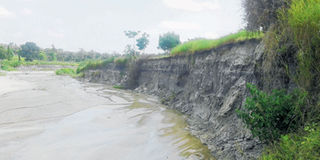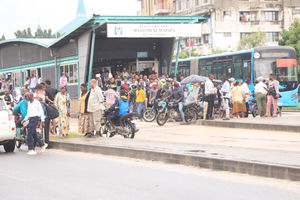Msimbazi River and disaster preparedness

A section of Msimbazi River bank exposed to erosion. The Ministry responsible for Environment and Municipal Authorities can address the problem. PHOTO | Deo Simba
What you need to know:
- The answer is always in the affirmative. Since it is possible to prevent or even reduce effects of natural disasters, what’s it preventing us from taking appropriate measures?
In December, 2011, Dar es Salaam was hit with flash floods that killed at least 23 people and displaced over 4,500 others. This was not the first time the city was brought to its knees by natural disasters. It happens almost every year. One question dominates debates surrounding natural disasters: can effects of such occurrences be prevented or at least reduced?
The answer is always in the affirmative. Since it is possible to prevent or even reduce effects of natural disasters, what’s it preventing us from taking appropriate measures?
The answer lies in our country’s disaster preparedness system. Often times, we are caught unaware or ill-prepared to such eventuality. Most of our plans remain in fat documents fathering dust on shelves, while on the ground, there isn’t much taking place.
According to experts, disaster preparedness refers to measures taken to prepare for and reduce the effects of disasters. That is, to predict and, where possible, prevent disasters, mitigate their impact on vulnerable populations, and respond to and effectively cope with their consequences.
Let’s focus on ‘measures taken to prepare for and reduce the effects of disasters’. Flood prone areas in Dar es Salaam (and other parts of the country) are well known. These include low-lying lands, wetlands and those close to major rivers.
Climatic patterns of Dar es Salaam are well known—short rains in November to December and the long rains starting March to May. These are the two critical times the city is often brought to its knees. This is when infrastructure is in bad shape slowing traffic and businesses in general.
Here is a proposition. We have a ministry responsible for Environment (currently, under the Vice President’s Office, and headed by Honourable January Makamba).
Given the fact that we are already in February, just a month away from the long rains in Dar, the ministry should dispatch a team of experts who will study all flood prone areas in a bid to prevent or minimise effects.
The team can draw members from the municipal authorities as well. Elected Members of Parliament from Dar es Salaam—Abdallah Mtolea (Temeke, CUF); John Mnyika (Kibamba, Chadema); Dr Faustine Ndugulile (Kigamboni, CCM); Issa Mangungu (Mbagala, CCM); Azzan Mussa Zungu (Ilala, CCM); Mwita Waitara (Ukonga, Chadema); Halima Mdee (Kawe, Chadema); Saed Kubenea (Ubungo, Chadema); and Bonna Kaluwa (Segerea, CCM)—should also participate.
What will the team do? It needs to inspect riverbeds and banks of all major rivers crisscrossing the city—Msimbazi, Mbezi and Mzinga Rivers—in a bid to establish the extent of damage caused by previous floods.
Experts must educate residents living close to rivers on the importance of managing waste properly instead of dumping it into the river.
They should reinforce weak points along the river banks. They should clear up where flooding effect had collected soil and dirty.
The purpose of doing this is to ensure that when the first rains come, riverbeds will be clear to allow water to flow freely, and so river banks will be protected against erosion.
Such measures may protect human lives and property. But, roads and bridges too will be safe, hence averting time and money always lost through long queues and reconstruction.
It’s time leaders stopped sleeping on the job and be proactive.
Mr Deo Simba is a senior sub-editor with The Citizen




